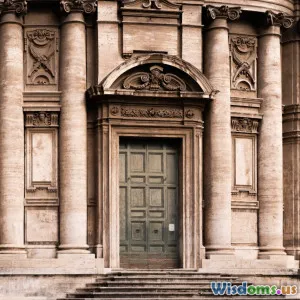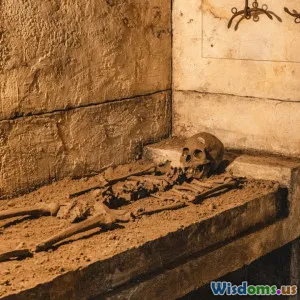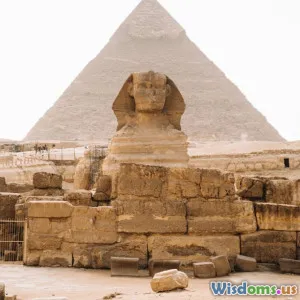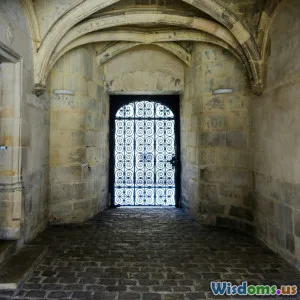
Underground Libraries Rumors The Search for Alexandria’s Secret Archives
9 min read Explore the captivating quest to uncover Alexandria’s rumored secret underground libraries and archives, blending history, myth, and modern discoveries. (0 Reviews)
Underground Libraries Rumors: The Search for Alexandria’s Secret Archives
Introduction: Unearthing the Mysteries Beneath Alexandria
For centuries, the city of Alexandria, Egypt, has stood as a symbol of knowledge, culture, and ancient scholarship. Home to the legendary Library of Alexandria, this ancient center of learning promised access to the world’s entire literary and scientific knowledge of its time. But almost simultaneously with the library's glory was its downfall shrouded in the mists of mystery — a happening that led to the loss of priceless manuscripts and documents. This gave rise to tantalizing rumors of secret underground libraries and hidden archives lying beneath the sands and rubble of modern Alexandria.
Are these underground bunkers of knowledge mere folklore, or do they conceal some of the world’s greatest lost treasures of antiquity? This article ventures deep into the origins, evidence, searches, and scholarly debates surrounding Alexandria’s elusive secret archives.
The Historic Legacy of the Library of Alexandria
The Library of Alexandria was unparalleled in ambition. Founded in the 3rd century BCE under the Ptolemies, it aimed to collect the entirety of human knowledge. Estimates suggest it housed hundreds of thousands of scrolls covering everything from astronomy to literature, geography, philosophy, and medicine. Its scholars pushed intellectual boundaries, shaping fields for centuries to come.
However, details about the physical structure are clouded by ancient accounts and later mythologies. The library's loss — possibly due to fires during Julius Caesar’s siege, civil wars, or political decrees — is regarded as one of history's greatest tragedies. But pivotal questions remain: Did some scrolls survive? Were they relocated? Or secreted underground to protect them from destruction?
Origins of the Underground Library Rumors
Rumors about underground libraries beneath Alexandria first emerged in medieval and Renaissance texts recounting discoveries of forgotten knowledge. Several factors spurred these legends:
-
Historical Precedent: Many ancient cultures, including civilizations in Mesopotamia and Egypt, related wisdom to hidden chambers or vaults. The Egyptian penchant for burying their dead and valuables underground supports the idea of subterranean secrets.
-
Legend of the Serapeum: The Serapeum, a temple dedicated to Serapis near Alexandria, reportedly housed hundreds of thousands of scrolls. When it was destroyed in the 4th century CE, survivors allegedly hid manuscripts in secret locations.
-
Archaeological Anecdotes: Sporadic finds such as caches of papyrus scrolls at sites around Egypt fuel theories that secret storages exist.
-
Early Explorers’ Accounts: Renaissance explorers described rumors from local guides mentioning hidden vaults beneath the city, whispering tales of labyrinths holding lost wisdom.
The Search: Modern Archaeology Meets Ancient Legend
Key Expeditions and Findings
-
François Auguste Ferdinand Mariette (19th Century): This French archaeologist first uncovered the Serapeum's underground halls near Alexandria in the 1850s. Massive halls with stone sarcophagi were found, but no direct evidence of secret libraries was uncovered. Nevertheless, Mariette’s discoveries reignited curiosity.
-
The Misses Thacker Conservations (Early 20th Century): British archaeologists working around Alexandria cataloged ancient ruins and reportedly examined subterranean chambers near the ancient city’s remains around 1920, but no conclusive archives were unearthed.
-
Recent Remote Sensing and Satellite Imaging: Efforts led by Egyptian antiquities authorities using ground-penetrating radar and satellite technologies have revealed extensive subterranean structures. However, many remain unexplored due to urban encroachment and logistical challenges.
Challenges Curtain the Search
-
Urbanization: Modern Alexandria, a bustling metropolis, overlaps major archaeological zones, making excavation risky.
-
Preservation Conditions: Papyrus and ancient materials are highly susceptible to decay, especially underground unless in perfect preservation environments.
-
Political and Funding Constraints: Political instability in the region has slowed archaeological progress.
Yet, technology is unveiling new possibilities. For example, in 2020 archaeologists near the ancient port discovered a cache of inscriptions in well-preserved condition, amplifying hope for uncovering fragile writings in future digs.
Insights from Scholarly and Local Perspectives
Dr. Miriam Khalil, a renowned Egyptologist, states: "While no definitive ‘secret library’ has been found, the existence of underground tunnels and storages offers tangible proof of deliberate preservation attempts. It’s conceivable that fragments of Alexandria’s knowledge corpus survive, hidden underground or dispersed in other collections."
Local myths fuel cultural identity as well. Elders in Alexandria speak of “the Shadow of the Scrolls”—an underground maze protecting ancient knowledge from the ravages of conquest and centuries. These stories bridge history and mysticism, inspiring continued fascination.
Parallels from Other Cultures: Secret Archives Underground
Alexandria's story isn’t unique in cultural memory. Consider:
-
The Dead Sea Scrolls Caves: Ancient Jewish texts hidden in caves were lost for millennia but eventually rediscovered, reshaping religious and historical understanding.
-
The Library at Nag Hammadi: Rediscovered in 1945, it revealed a trove of Gnostic gospels, challenging existing Christian histories.
These examples demonstrate how subterranean caches can safeguard knowledge through history’s upheavals.
Conclusion: The Enduring Allure of Lost Knowledge
The search for Alexandria’s secret archives is more than a quest for physical scrolls. It symbolizes humanity’s yearning to reconnect with lost chapters of intellectual brilliance. While definitive proof of vast underground libraries remains elusive, the interplay of history, myth, and modern archaeology continues driving explorations.
Even if the treasures of Alexandria’s hiatus of knowledge never emerge, the story itself teaches us timeless lessons: the fragility of knowledge, the triumph of preservation, and the endless human quest to seek truth — sometimes beneath the earth we tread.
Call to Action
Conserving ancient sites and investing in advanced archaeological technology are paramount to uncovering and protecting such cultural heritage. Each discovery, big or small, enriches our collective history and empowers future generations.
If you find this journey through history inspiring, consider supporting organizations engaged in preserving archaeological sites or sharing this knowledge to keep Alexandria’s legacy alive.
References & Suggested Reading
- Canfora, Luciano. The Vanished Library: A Wonder of the Ancient World. (2007)
- Redford, Donald B. Egypt, Canaan, and Israel in Ancient Times. (1992)
- Gezari, Salima Ikram. "The Serapeum of Alexandria Anniversary Proceedings", Journal of Egyptian Archaeology (2015)
- Grainger, John D. The Library of Alexandria: Centre of Learning in the Ancient World. (2011)
This exploration of underground libraries is a tribute to the enduring fascination with Alexandria’s secret past and the undying human spirit that seeks knowledge against all odds.
Rate the Post
User Reviews
Popular Posts



















